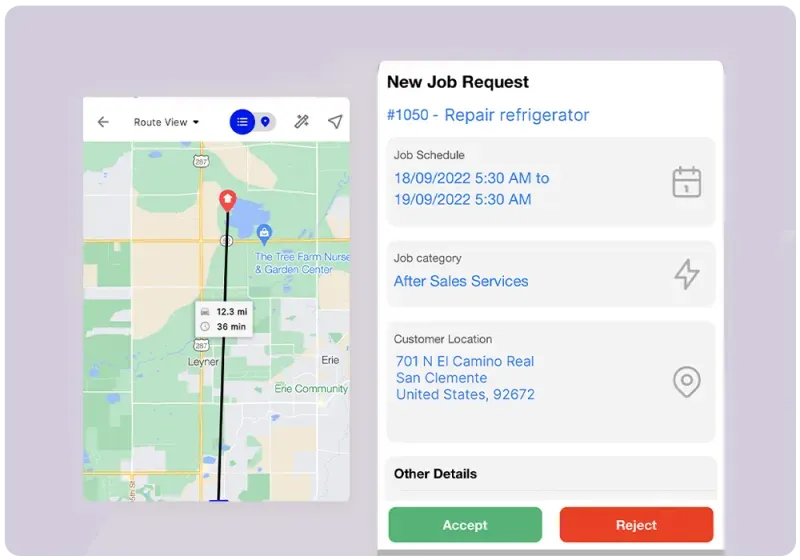By Anand Subbaraj, CEO of Zuper — An innovation revolution is well underway in facilities management (FM) as the built environment is being rebuilt with artificial intelligence (AI) that is helping managers increase efficiencies, cut costs, and improve customer service.
According to the International Facility Management Association (IFMA), FM has become “data-driven,” and new AI-powered technology offers “enormous potential” for the future of the industry. And not a moment too soon, as FM professionals continue to be challenged by budget constraints, staff shortages, and an ongoing focus on making their buildings and facilities more sustainable. The sheer pace of all this change can be dizzying, and top of mind for FM leadership headed into next year will be how to turn AI’s theoretical promise into tangible solutions.

Example of work order software interface. Image courtesy of Zuper
5 ways AI can empower FM professionals
Here are 5 powerful ways FM professionals can use AI to drive value and transformation in the industry:
- Integrate AI with IoT to generate data-driven insights and power predictive maintenance
The Internet of Things (IoT) represents a network of interconnected sensors that capture data and help provide insights that improve decision-making, especially when it comes to the future health of various assets. As Deloitte explains, FM professionals can use IoT devices to gather data from multiple sources (remote diagnostic tools, historic performance, field reports, etc.) and conduct AI-enabled analysis to understand their network more deeply. Other research from Deloitte indicates that implementing IoT for predictive maintenance and asset monitoring leads to a 20–30% reduction in maintenance costs. By getting ahead of problems before they arise, facility managers can better direct resources and reduce unnecessary repairs.
FM Pro Tip: Start with a pilot program focusing on critical equipment to demonstrate quick wins. Then, once ROI is proven, gradually expand to other areas.
- Deploy an AI-driven field service management (FSM) system that can automatically assign technicians to tasks based on multiple variables
Historically, assigning field service technicians has been a manual process prone to human error. When techs don’t have time to finish a job it can quickly tank productivity across the board, leading to employee burnout and frustrated customers. But with AI, field service techs can be autonomously dispatched based on real-time data, preferences, and proximity, thereby optimizing routes and reducing inefficiency costs. Recent research shows that 80% of high-performing field service teams use AI, and that automation can significantly increase employee/customer satisfaction scores.
FM Pro Tip: Use your FSM solution to dispatch in a small department or region first to test-and-learn how AI-assigned technicians compare to your current back-office operations.

Example of New Job Request and route map. Image courtesy of Zuper
- Infuse AI into CRM systems to create a 360-degree view of each customer
As customer expectations continue to evolve, there is far less tolerance nowadays for downtime. To get more proactive, FM professionals use AI to analyze their CRM data to uncover usage patterns, track reporting on equipment health, and create a bespoke customer profile that triggers preemptive service notifications. When customers don’t have to initiate contact, service teams spend less time on conflict resolution and more time building relationships. According to Forrester, customer-obsessed organizations reported 41% faster revenue growth, 49% faster profit growth, and 51% better customer retention than those who aren’t customer-obsessed.
FM Pro Tip: To help convince leadership to infuse AI into CRM, explain how customer service teams can scale faster by handling more issues, without sacrificing the quality of care.
- Introduce AI-powered training programs to upskill technicians continuously and encourage professional growth
Given the myriad issues that could go wrong with a building at any moment, retaining employees with institutional knowledge is a big priority for facility managers. Studies have shown that it’s far more cost-effective to upskill current employees than to hire/onboard new talent, and AI can help level up technicians by providing critical on-the-job training. On average, teaching an employee a new skill is one-third of the cost of onboarding a new employee, according to the same research. Techs can also receive AI-driven feedback after completing assignments, helping to foster continuous improvement and boost morale.
FM Pro Tip: Implement short, targeted AI-driven training modules technicians can complete on company time. This allows them to learn specific skills as needed, keeping their knowledge current while minimizing disruption to their daily tasks.
- Analyze energy usage patterns with AI to reduce environmental impact
This year, the Department of Energy released a comprehensive plan to reduce greenhouse gas (GHG) emissions from buildings by 65% by 2035 and 90% by 2050. Given this new imperative, FM professionals are rapidly updating their building information modeling (BIM) with AI-powered tools for a more comprehensive view of their sustainability targets, helping further reduce waste, decrease energy consumption, and optimize operations.
FM Pro Tip: Implement small, data-backed changes to your energy usage in different departments to see if there is a direct impact on output and overall cost.
Unlocking the value of AI
AI integration is crucial for boosting efficiency and sustainability in facilities management. It is not just a trend; it’s a transformative shift that enables professionals to anticipate needs and streamline operations.
As you explore these strategies, consider how each AI application can be tailored to your unique environment. The path to effective AI adoption begins with a commitment to continuous improvement and a willingness to innovate. By investing in these technologies today, you are not only enhancing your operations but ensuring that you are equipped to meet tomorrow’s demands.
About the author
 Anand Subbaraj is the CEO and co-founder of Zuper, a provider of solutions designed to modernize and scale forward-looking field service businesses. With more than 17 years of experience in technology, including 13 years at Microsoft, Anand is an expert in big data, cloud computing, and SaaS. He is committed to pushing the field service industry forward through the use of intelligent automation and by staying connected with customers to understand and solve their most pressing challenges.
Anand Subbaraj is the CEO and co-founder of Zuper, a provider of solutions designed to modernize and scale forward-looking field service businesses. With more than 17 years of experience in technology, including 13 years at Microsoft, Anand is an expert in big data, cloud computing, and SaaS. He is committed to pushing the field service industry forward through the use of intelligent automation and by staying connected with customers to understand and solve their most pressing challenges.




